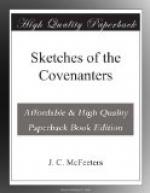2. How did he deal with the Covenanted Church?
3. How had the General Assembly previously deteriorated?
4. Give the downward steps.
5. What two parties henceforth in the Church?
6. By whom was the truth preserved?
7. What principle governs the true followers of Christ?
8. What distinguishes the largest Church?
XXII.
An illustrious martyr.—A.D. 1660.
Archibald Campbell, the Marquis of Argyle, was the first martyr to suffer at the hand of King Charles II. Twenty-two years had this illustrious nobleman been in special training for the honors of a martyr. He became identified with the Covenanters at the General Assembly of 1638. From that time he brought his influence, wealth, power, and office into the service of his Covenant Lord, and grew mighty in the cause of God. He ripened early in convictions and hallowed experiences, which won for him the highest distinction conferred upon mortals—martyrdom. He was in the prime of his years, at the summit of his earthly career, when he gave his life for the cause of Christ. He was a true warrior; every drop of his blood was electrified with heroism. In meeting death he felt the military spirit throb, but suppressing it he calmly said, “I could die as a Roman, but choose to die as a Christian.”
This was a cedar of Lebanon, a choice tree of God, distinguished for its grace, strength, and height, towering above the trees of the forest. Therefore the first blast struck it with such deadly force. Then descended the terrific storm upon the lesser trees, and the mountain of God’s house was strewn with them. The next twenty-eight years were filled with lamentation, and mourning, and woe. Let us look at the condition of the Covenanted Church, as this age of horror settles down upon Scotland.
When Cromwell had reduced Scotland, he attempted to convert the Covenanted Church to Congregationalism. Though he possessed some amiable qualities, yet this ignoble work was attempted in the spirit of a Turk—with the Bible in one hand and the sword in the other. A resolution in favor of Congregationalism was introduced in the General Assembly of 1652. This was voted down. The military suppression of the Assembly at its next meeting was Cromwell’s bitter revenge. Yet we must not fail to see the hand of God in the overthrow of the Supreme Court of His House. As with the Temple at Jerusalem before its destruction, this Temple was already desolate; the glory had departed ere the storm of Divine wrath smote it. The resolution of the “Resolutioners,” some years previous, favoring the repeal of the “Act of Classes,” was a gross violation of the Covenant, and the proceedings in the Assembly had thereby degenerated into bitter debate. The Assembly had lost its power for good and, therefore, its right to exist; this part of the golden candlestick had exhausted its oil and God removed the useless part.




